
Article I, section five, of the U.Southward. Constitution provides that "Each House [of Congress] may determine the Rules of its proceedings, punish its members for disorderly behavior, and, with the concurrence of 2-thirds, expel a member." Censure is a form of discipline used past the Senate confronting its members (sometimes referred to as condemnation or denouncement). A formal statement of disapproval, a censure does not remove a senator from office. Since 1789 the Senate has censured nine of its members.
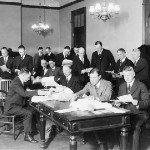
The United States Constitution gives each house of Congress the power to be the judge of the "elections, returns, and qualifications of its ain members" (Article I, section 5). Since 1789 the Senate has carefully guarded this prerogative and has adult its ain procedures for judging the qualifications of its members and settling contested elections.
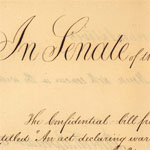
The Constitution grants Congress the sole ability to declare war. Congress has declared state of war on 11 occasions, including its commencement declaration of war with Great United kingdom in 1812. Congress approved its last formal announcement of state of war during World War 2. Since that time it has agreed to resolutions authorizing the use of armed services forcefulness and continues to shape U.Due south. military policy through appropriations and oversight.

Article I, section 5, of the U.South. Constitution provides that each house of Congress may "punish its members for hell-raising behavior, and, with the concurrence of two-thirds, expel a member." Since 1789 the Senate has expelled simply 15 members.

The Senate has a long history of using the filibuster—a term dating dorsum to the 1850s in the United States—to delay debate or block legislation. Unlimited debate remained in place in the Senate until 1917, when the Senate adopted Rule 22 that allowed the Senate to end a argue with a two-thirds majority vote—a process known every bit "cloture." In 1975 the Senate reduced the number of votes required for cloture from two-thirds (67) to three-fifths (60) of the 100-member Senate.
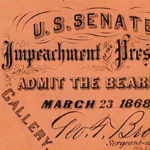
Under the Constitution, the House of Representatives has the power to impeach a government official, in effect serving as prosecutor. The Senate has the sole power to acquit impeachment trials, essentially serving every bit jury and judge. Since 1789 the Senate has tried 20 federal officials, including iii presidents.

Congress has conducted investigations of malfeasance in the executive branch—and elsewhere in American social club—since 1792. The need for congressional investigation remains a disquisitional ingredient for restraining regime and educating the public.
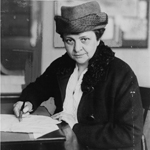
The Constitution provides that the president "shall nominate, and by and with the Communication and Consent of the Senate, shall appoint Ambassadors, other public Ministers and Consuls, Judges of the Supreme Court, and all other Officers of the United states… (Article 2, Section two)." The Senate has ever jealously guarded its power to review and approve or reject presidential appointees to executive and judicial branch posts.

The Senate is governed by the Constitution, a gear up of standing rules, precedents established in the form of the legislative process, and special rules of process adopted by statute for detail types of legislation. These rules determine how bills and resolutions are moved towards passage, the construction of Senate committees, how argue gain on the chamber flooring, and how members cast votes.
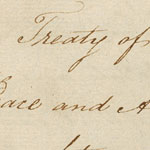
The Constitution gives the Senate the power to approve, by a 2-thirds vote, treaties made by the executive co-operative. The Senate has rejected relatively few of the hundreds of treaties it has considered, although many have died in commission or been withdrawn by the president. The Senate may also amend a treaty or adopt changes to a treaty. The president may also enter into executive agreements with foreign nations that are non field of study to Senate blessing.
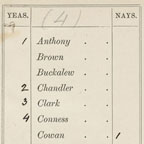
The Senate takes action on bills, resolutions, amendments, motions, nominations, and treaties by voting. Senators vote in a variety of ways, including gyre telephone call votes, voice votes, and unanimous consent.











0 Response to "10 the House of Representatives Has the Special Power to"
Post a Comment